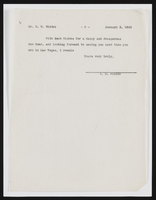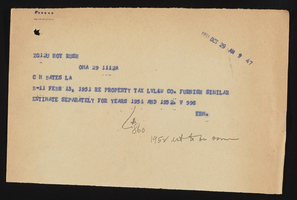Search the Special Collections and Archives Portal
Search Results
Dwyer, Kay C.
Kay Dwyer was born August 30, 1934 to James and Eileen Crawford. Her father attained a job as an accountant with Basic Magnesium Incorporated in 1942. This moved the family to Henderson, Nevada, which was a brand new community in the early 1940s. In 1952, Dwyer graduated from Basic High School and then moved to Los Angeles, California to attend Pepperdine University for two years. She moved back to the Las Vegas, Nevada area and started a family with Stanly Hardy with whom she had three children.
Person
Argüello-Kline, Geoconda
Geoconda Argüello-Kline was born July 7, 1955 and was raised in Nicaragua. She left Nicaragua in 1979 as a political refugee and settled in Miami, Florida. The wages there did not allow her to take care of her family, so she moved to Las Vegas, Nevada following family members who had taken union jobs upon their arrival. She joined as well and worked as a guest room attendant for eight years.
Person

Transcript of interview with Patricia Mulroy by Stefani Evans and Claytee D. White, January 03, 2017
Date
Archival Collection
Description
Patricia Mulroy served Las Vegas as the general manager of the Las Vegas Valley Water District from 1989 to 2014. She served the state of Nevada as the general manager of the Southern Nevada Water Authority from 1993 to 2014. Patricia helped to build the Authority, and saw the state through the devastating drought of the Colorado River. Patricia was born in Frankfurt, Germany on February 24, 1953. As a young girl, she lived in several different countries, but always felt that the United States was her home. Her experiences abroad fed her to develop a fascination with government work and state service. She arrived in Nevada in 1974 to attend UNLV. In 1989, Patricia became the general manager of the Las Vegas Valley Water District. She entered the field at a tumultuous time, facing the drought of the Colorado River and tension within the districts. She pioneered the Water Authority, which revolutionized Southern Nevada’s water rights system and allowed the districts to deal with the issue cooperatively. She worked with other Southwestern states and Mexico to support Las Vegas and Nevada through the drought. Patricia retired in 2014, but has chosen to remain active in politics and business. She is currently working with the World Bank in China on the World Economic Forum. She is also a nonresident Senior Fellow at the Brookings Institute, a faculty advisor for the Desert Research Institute, and a board member of the Wynn Board of Directors.
Text

Transcript of interview with Randall "Randy" Walker by Stefani Evans, November 2, 2017
Date
Archival Collection
Description
In twenty-first-century, urban America, Randall "Randy" Walker is one of the few fathers who can say he raised his children in the same house in which he grew up. Walker did not inherit the house at 443 Republic Street, in Henderson. Instead, Walker bought the house from his parents after he graduated from Brigham Young University in Utah, worked with Exxon Oil Company in Houston, returned to Southern Nevada to work in his first government job as a budget analyst for Clark County, and sold the house he previously owned. He did not have to move his wife and children far-their previous home was at 442 Republic Street, directly across from his parents. In this oral history, Walker shares why his family came to Henderson in 1952, describes growing up in the small town of his youth, and tells what it was like to have his father as his high school Spanish teacher. He focuses on his career in government and how he applied his accountant mindset to the various positions he held with Clark County, the Las Vegas Metropolitan Police Department, the City of Las Vegas, and McCarran Airport. Along the way he shares his experiences with large governmental building projects such as the first 911 Call Center, the Downtown Transportation Center, the Regional Justice Center, and at McCarran Airport, the D v Gates, Terminal 3, and the airport tunnel and connector roads. He explains how his work with these various projects brought him into interaction with such diverse fields as architecture, accounting, construction, design, infrastructure, public art, public safety and local, state, and national politics. Throughout, Walker displays the collegial and common-sense approach to government, leadership, and problem solving that grounds the decisions he makes and explains why Richard Bunker wanted him at Clark County, why Clark County leaders recruited him to be county manager (and why that did not happen), and why McCarran Airport was able to accommodate without interruption Southern Nevada's record-breaking growth in residential and tourist traffic, and why, even in his absence, McCarran was the first major airport allowed to reopen following the 2001 September Eleventh terror attacks.
Text

Interview with Layton James O'Neill, July 2, 2004
Date
Archival Collection
Description
Text




